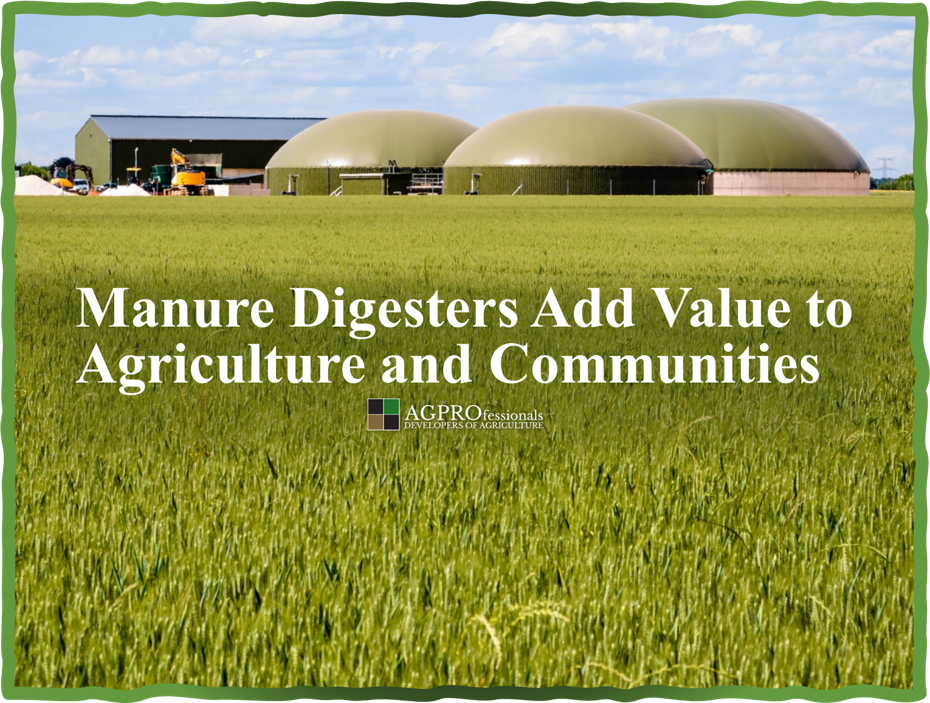Manure Digesters Add Value to Agriculture and Communities
Alternate revenue streams in agriculture are becoming increasingly important as farmers and ranchers struggle with rising costs due to inflation and other market conditions. Diversification has become a vital component of the long-term financial viability of many farms. The utilization of manure digesters is emerging as a viable way for farmers to generate additional income and help meet consumer demand for sustainable practices.
What Anaerobic Digesters Do
Farmers can utilize anaerobic digesters as a part of an integrated manure management approach. Methane is created when organic materials such as manure decompose in an oxygen-free environment, like a landfill or lagoon. Anaerobic digesters capture methane, and a renewable source of energy is created called biogas. In addition to creating biogas, anaerobic digestion produces a material called digestate, a nutrient-rich and stable biproduct.
Benefits of Anaerobic Digesters
According to the United States Environmental Protect Agency’s (EPA) website, anaerobic digesters offer a long list of benefits to the farmer, the local community, and the environment:
- Reduces methane emissions from manure lagoons, stockpiles, and storage ponds
- Captures methane gas, reducing greenhouse gas emissions (GHGs)
- Creates biogas and can be used to generate electricity, heat, and fuel for onsite use or sale to the local grid, which means it can replace some fossil fuel uses
- Minimizes odors
- Protect animal and human health by reducing pathogens
- Generates products for use on the farm, such as animal bedding and high-quality fertilizer
- Can allow farmers to operate “off the grid” and reduces reliance on utilities
Soil Health
In addition to energy production, odor, and pathogen control, the residual digestate provides many benefits, from improving soil health to farm ecology. Digestate contains nutrients such as potassium, nitrogen, and phosphorus. The solid digestate may be composted or heat-dried to make fertilizer pellets before land application. It is important to note that digestate applied to land is subject to state and federal regulations.
The EPA lists the following benefits of digestate when applied to farm fields:
- Increases organic matter content
- Used to feed and nourish the soil, reducing the need to apply chemical fertilizers and pesticides
- Improves plant growth
- Reduces soil erosion and nutrient runoff, alleviating soil compaction
- Helps increase the soil’s water retention ability, which reduces the need for irrigation
- To ensure that land application is properly done, a nutrient and soil management plan is required in most states.
Odor and Pathogen Reduction
Since digesters utilize a closed system to break down manure and are typically built on top of manure lagoons, the digesters help to significantly control odors. Odor control is just one of the ways neighbors and communities near large modern farms can benefit from installing anaerobic digesters. According to the EPA, anaerobic digestion of manure can have a “pathogen-reducing effect with as much as 95-98% of common pathogens eliminated in mesophilic (~ 100 degrees Fahrenheit) digesters. The reduction in pathogens has the potential to be of benefit for: manure application in impaired watersheds when trying to manage certain pathogens such as Mycobacterium paratuberculosis (MAP or Johne’s) or salmonella…”.
The Future of Anaerobic Digestion on Farms
In the future, we will see more farms utilizing anaerobic digesters as technology progresses and economically smart digester solutions are developed for a variety of farming operations. Along with the numerous benefits we have listed, carbon credits will also become a part of the picture. At AGPROfessionals, we have extensive experience working with anaerobic digester developers and farmers on farm and site selection, permitting, engineering, and more.'
Links:
EPA Article, "Benefits of Anaerobic Digestion HERE
EPA Article, "Anaerobic Digestion Environmental Benefits" HERE
Farm Energy Extension Article, "Environmental Benefits of Anaerobic Digestion" HERE
Farm Energy Extension Article, "Anaerobic Digesters and Biogas Safety" HERE
Farm Energy Extension Article, "Transformation and Agronomic Use of Nutrients from Digester Effluent" HERE
USDA Article, "Anaerobic Digesters are the Sweet Smell of Success" HERE

